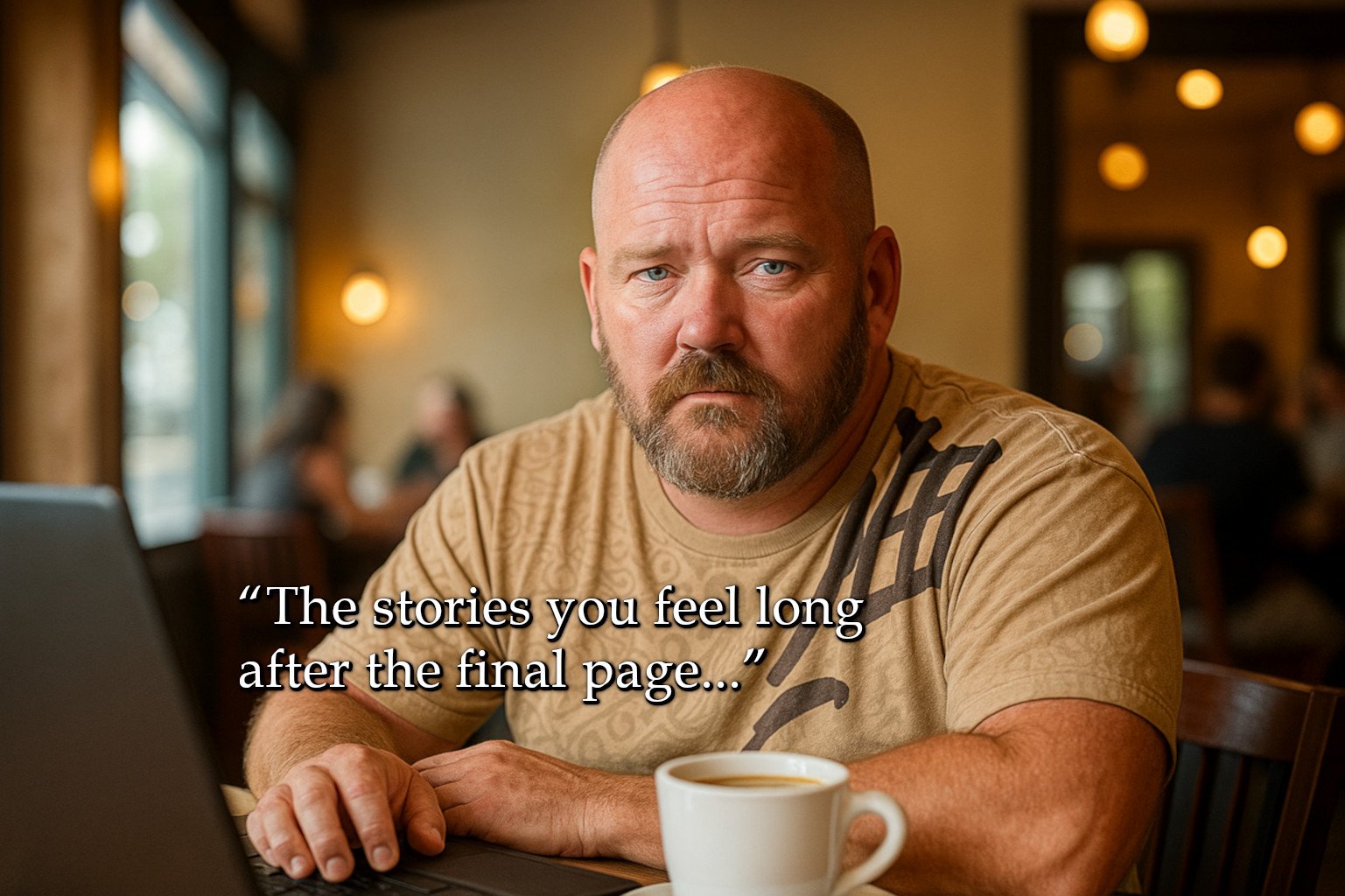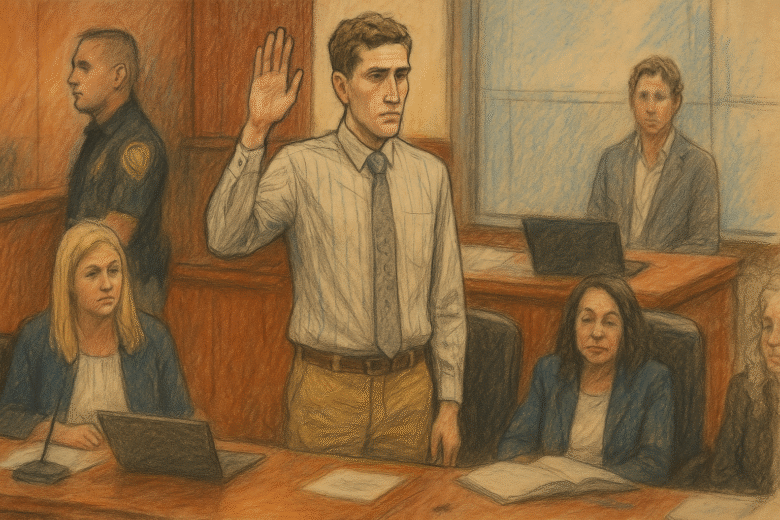Bryan Kohberger stood with his hand raised, fingers straight and pale like bones under the courtroom lights. His shirt was pressed, his tie neatly cinched, and yet something about him felt hollow. It was as if he had been dressed by someone else and dropped into the moment without instructions.
Bryan Kohberger did not blink as the oath was read to him, “Do you swear to tell the truth, the whole truth, and nothing but the truth, so help you God?”
“I do,” he said. His voice was calm. Too calm.
Room 203 of the Latah County Courthouse had seen its share of tragedy. But it had never seen this.
His attorneys flanked him like gray shadows. One leaned in to whisper something, but he did not respond. His gaze was fixed. Not on the judge, not on the prosecutors, but somewhere just above the gallery. He was not quite looking at the families, but close enough to make them shift in their seats.
In the second row, a woman gripped a tissue so hard it tore in half. She did not cry. She just watched him like she had watched the door of her daughter’s bedroom every day since November thirteen.
The clerk cleared his throat, “State of Idaho versus Bryan Kohberger. Case number CR28221148.”
The number did not matter. The charges did. Four counts of first-degree murder. One count of felony burglary. And a plea that had been more than a year in the making.
“Mr. Bryan Kohberger,” the judge said, “you are now prepared to enter a plea?”
Bryan nodded. Once. “Guilty.”
Gasps. Then silence. A strange vacuum pulled at the air in the courtroom as if everyone had exhaled at once and forgotten how to breathe back in.
He did not elaborate. He did not explain. He did not apologize.
He lowered his hand and sat down.
But there was a time, not long ago, when Bryan Kohberger was just another doctoral student in criminology. When the streets of Moscow, Idaho, were still quiet. When Madison Mogen was still alive.
November 12 — early hours of the 13th
Madison Mogen had closed up her shift at the local restaurant around 10 p.m. She and Kaylee Goncalves laughed their way down Main Street, stopping at the food truck. The crisp night air carried their chatter as they shared fries and secrets at 1:41 a.m., proud of Kaylee’s new car and the future ahead.
They made it back to the four-bedroom house, sleepy from a long week. By 4:00 a.m., everything was still, too still.
Madison dreamed of spring blossoms. Kaylee nearly drifted off to a podcast until a thud snapped her awake. Somewhere down the hall, a whispered male voice said, “It’s okay, I’m going to help you.” Her heart thudded against her ribs. Confused.
Madison heard it too. She turned toward the door, mind half-awash in sleep. By the time she was fully awake, steps, soft and relentless, passed her doorway. A figure clad in black, masked, stopped at the threshold. She tried to scream, but her throat failed. The man turned, passed, and disappeared down the dark hallway.
Madison jolted upright, adrenaline rushing. She glanced beside her. Kaylee was awake, terror in her eyes. They moved to help Xana and Ethan, but something whispered in Madison’s mind, Get out of here. Her legs obeyed, heart pounding.
Sirens were far away. She reached the hallway where the masked man had lingered, not a flicker of humanity in his gait. Just cold purpose. The hallway lights cast distorted shapes across his face-concealed features. His black clothes, as silent as death.
After he left, minutes or hours slowly passed. Kaylee squeezed her hand. They stayed frozen until later, until the call, “Please send someone… someone… unconscious person.” But the damage was done.

Did Bryan Kohberger Deserve A Deal?
Ben Mogen didn’t flinch when the word came.
“Guilty.”
He had played that moment out in his head a thousand different ways. Sometimes he imagined Bryan Kohberger yelling it, spitting it, dragging it out in defiance. Other times, he pictured the courtroom exploding into noise. But none of that happened.
It was quiet. The kind of quiet that feels like standing at the edge of something you can’t go back from.
Ben stared straight ahead. His jaw was tight. There was nothing triumphant about it. No comfort. Just weight. But behind the weight was something else. Not peace, not yet. But maybe the path toward it.
Across the aisle, Jim Chapin sat with his hands folded. Stacy beside him reached up and dabbed her eyes, though no tears had fallen yet. Not today.
This was not closure. There was no such thing. But it was something.
They had agreed to the plea. The state had asked their blessing, and they had given it. Not because they were soft. Not because they wanted to forget. But because they knew what came with trials like this. The images, the arguments, the games. The endless cycle of appeals. The chance that something small and stupid could unravel the entire case and force them to start again.
Ben had helped write the statement himself, every word carefully, “The plea deal the prosecution has proposed is one that punishes the perpetrator of this horrific crime, protects the public from further harm, and allows all of us who knew and loved these four young people the time to grieve without the anxiety of the long and gruesome trial, years of appeals, and potential mistrials along the way.”
He meant every word. They all did.
Still, hearing it spoken aloud was different. It made the finality real.
Across the courtroom, Kohberger never turned his head. Never once looked at the families.
Which was fine. Ben didn’t need to be looked at. He needed to go home. He needed to sit with the ache in his chest and know that, for now at least, the spinning had slowed.
They would carry this for the rest of their lives. But the story didn’t belong to the killer anymore. It belonged to them.
No Time to Scream
The stairs creaked under his weight. Bryan moved through the house like a shadow, calm and unhurried. The black gloves on his hands made no sound against the railing. In one hand, the fixed-blade knife. In the other, nothing. He had no need for a second hand. He had done this in his mind a thousand times.
Down the hall, a door was cracked open. Inside, Xana Kernodle sat upright in bed, her phone in her hand. Something had woken her. Maybe a sound. Maybe a feeling. She glanced at the time. Four seventeen.
Next to her, Ethan shifted, groggy, “What’s wrong?”
“I think someone’s here,” Xana whispered.
He sat up, blinking hard. “What?”
Then the door opened. There was no pause, no question. The figure stepped into the room with the kind of confidence that meant he had planned this. Thought it through. Every second. Every step. Every exit.
Ethan stood up first, instinct taking over. He was taller. Broader. But unarmed. He tried to shield Xana, but the knife was fast. Flashing. Controlled.
The first stab hit his chest. Xana screamed. The second cut through his side. The third landed with force that bent him forward. He collapsed halfway over the bed, his arm outstretched toward her.
Bryan turned. Xana was already moving. She had made it to the far side of the room. She grabbed a glass and threw it. It shattered against the wall, far too wide to matter. She tried to scream again, but her voice caught. Her breath was broken by sobs that came too fast to be useful.
He crossed the room quickly. Not a run, but not slow. There was no panic in him, just follow-through.
Xana grabbed her phone. Her thumb hovered over 9. She never made it to 1. The blade found her neck first. Then her side. Then her hands, raised to stop him.
She fought. They would later say she fought more than anyone. Defensive wounds. Skin under her nails. She had not gone quietly. But still, she went.
The hallway was quiet again. Behind him, Ethan lay facedown. Xana beside him, on the carpet. He looked down at his work. His chest rose once, steady. And then he left.
Back down the stairs. Out the sliding door. Into the darkness. In a few hours, the world would know. But for now, King Road slept. Two floors. Four lives. And still, he was not done.

The Voices That Wanted More
Not everyone sat quietly when the word “guilty” was spoken. Steve Goncalves leaned forward in his seat, his hand gripping the bench in front of him. His face didn’t move, but his eyes burned. His daughter, Kaylee, was one of the four. And to him, this wasn’t justice. It was surrender.
He had posted about it days before the hearing, when word of the plea deal started to spread. In black letters on a white background, his words were sharp, plain, and raw, “This is our last shot. Judge Hippler, you are our only hope that our child murderer isn’t granted control over his destiny in our children’s names. You take control of this deal and make it right because now you OWN IT.”
All caps. Final words underlined in fury. He had asked for a trial. For cross-examinations. For the evidence to be laid out where the world could see it. He had wanted the mask off. Not just the one Bryan Kohberger wore that night, but the one he wore in court, too.
Next to him, family members sat in quiet support. But the grief felt heavier, sharper, like it had been reshaped into something pointed.
Across the courtroom, Jeff Kernodle sat with his arms crossed. His daughter Xana had been the last to die, they believed. She had fought. That word stuck with him more than the others. She fought.
He had stayed mostly quiet until now, but when the plea was announced, he didn’t hold back. He echoed Steve’s anger. The deal felt too easy. Too clean. It let Bryan skip the part where he had to answer for what he did in full daylight. It let him vanish into the system without ever really being seen.
The Chapins and the Mogen family had their reasons, and he respected them. He understood the exhaustion. The need to be done. But he wasn’t done. Not yet.
As the courtroom emptied, Steve stood in place a moment longer. He looked at the bench where Bryan had sat. Looked at the judge. Then back at the door through which he had entered. The man who had taken their children’s lives had just taken control of how his own would end. And Steve couldn’t let that sit.
The Ones Who Stayed Silent
Bryan stepped over the threshold and pulled the door shut behind him. Not loud. Not rushed. Just closed.
The hallway was quiet again. He listened for movement. Nothing. No doors creaking. No sudden voices. If the other two girls had heard anything, they were hiding. Or they were frozen. Or they were asleep.
He took the stairs slowly. His footsteps were deliberate, but measured. He knew the layout. He had studied it. Hours of scrolling. Watching. Waiting.
On the first floor, a bedroom door sat closed. Inside, one of the surviving roommates lay curled in bed, awake but still. Her phone sat untouched beside her. She had heard something. Not everything. Just a sound. Like a thump upstairs. Then maybe a sob. Then nothing.
She wasn’t sure if it had been a dream. A few minutes earlier, she thought she had heard crying. She opened her door just slightly, just long enough to peek into the dark hallway.
And that was when she saw him. A man, dressed in black. Tall. Wearing a mask that covered everything but his eyes and eyebrows. He did not run. He did not speak. He walked past her and headed for the sliding door.
She had frozen in place, one hand still on the knob. The man left the way he came. Out the back.
She shut her door. Locked it. Sat on the floor and waited. Hours passed before anyone made a call.
Upstairs, the bodies were still. The air was still. The night had stopped.
Bryan returned to his car. He didn’t look back at the house. He didn’t check the time. He already knew it. Four twenty-five. His hands were clean. He had planned for that too.
Back across state lines, he pulled into a parking lot near his WSU apartment, wiped the steering wheel again, then took a photo of himself. He smiled in it.
Later, investigators would say he came back to the house again. Just before nine in the morning. Drove by. Stayed for ten minutes. Watched. But that was later.
For now, the sun began to rise over Moscow. The lights were still off in the King Road house. Inside, the world had changed. And no one knew it yet.
The house on King Road no longer stands. It was torn down months later, not because anyone wanted to forget, but because no one could move forward while it still stood. It had become too quiet. Too known. A place once filled with laughter, with backpacks slung on kitchen chairs and music leaking under bedroom doors, had become something else entirely.
But the people who lived in it are remembered. Madison Mogen. Kaylee Goncalves. Xana Kernodle. Ethan Chapin. Bryan Kohberger will become a footnote and fade away as people move on, but the names of his victims will always be remembered.
Why The Story Of Bryan Kohberger Hit Home For Me
When the details of the Idaho murders began to unfold, I couldn’t help but feel an uneasy pull. Not because I had predicted them, and certainly not because I wanted to, but because the world I created years earlier in Joker Joker Deuce shared a chilling, accidental overlap.
My screenplay was written long before the 2022 killings in Moscow, Idaho. It was optioned in 2019, well before anyone had heard the name Bryan Kohberger. But even then, the story followed a college town. A loner. A campus community slowly unraveling under the weight of quiet violence. In fiction, it was Jeph. In real life, it was someone else.
Jeph was never one for spree killing. That wasn’t his style. His choices were more calculated, more intimate, more psychological. But the environment, the college town, the students, the disconnected man drifting on the fringe of a youthful world that no longer noticed him, felt eerily familiar when this case broke into headlines.
He walks past them every day. Hears their laughter. Watches the ways they move through life as if it owes them something. He doesn’t belong there, but he stays. That’s Jeph. And that could have been anyone.
The tragedy in Idaho proved what I only played with in fiction: that monsters don’t always look the part. That some of the most dangerous people aren’t hiding in the shadows. They’re sitting in classrooms. Holding degrees. Taking notes.
The story I told in Joker Joker Deuce wasn’t about a true crime. But it could have been. And that’s what haunts me now. Because fiction isn’t supposed to feel real until it suddenly does.




